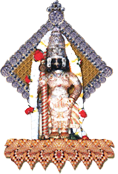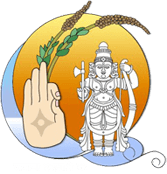यां इमां पुष्पितां वाचं प्रवदंति अविपश्चितः ।
वॆदवादरताः पार्थ न अन्यत् अस्ति इति वादिनः ॥ २.४२ ॥
काम-आत्मनः स्वर्ग-परः जन्म-कर्म-फलप्रदम् ।
क्रिया-विशॆष-बहुलां भॊग-ऐश्वर्य-गतिं प्रति ॥ २.४३ ॥
भॊग-ऐश्वर्य प्रसक्तानां तया अपहृत-चॆतसाम् ।
व्यवसाय-आत्मिका बुद्धिः समाधौ न विधीयतॆ ॥ २.४४ ॥
ಯಾಂ ಇಮಾಂ ಪುಷ್ಪಿತಾಂ ವಾಚಂ ಪ್ರವದಂತಿ ಅವಿಪಶ್ಚಿತಃ |
ವೇದವಾದರತಾಃ ಪಾರ್ಥ ನ ಅನ್ಯತ್ ಅಸ್ತಿ ಇತಿ ವಾದಿನಃ || ೨.೪೨ ||
ಕಾಮ-ಆತ್ಮನಃ ಸ್ವರ್ಗ-ಪರಃ ಜನ್ಮ-ಕರ್ಮ-ಫಲಪ್ರದಮ್ |
ಕ್ರಿಯಾ-ವಿಶೇಷ-ಬಹುಲಾಂ ಭೋಗ-ಐಶ್ವರ್ಯ-ಗತಿಂ ಪ್ರತಿ || ೨.೪೩ ||
ಭೋಗ-ಐಶ್ವರ್ಯ ಪ್ರಸಕ್ತಾನಾಂ ತಯಾ ಅಪಹೃತ-ಚೇತಸಾಮ್ |
ವ್ಯವಸಾಯ-ಆತ್ಮಿಕಾ ಬುದ್ಧಿಃ ಸಮಾಧೌ ನ ವಿಧೀಯತೇ || ೨.೪೪ ||
yAM imAM puShpitAM vAchaM pravadaMti avipashchitaH |
vEdavAdaratAH pArtha na anyat asti iti vAdinaH || 2.42 ||
kAma-AtmanaH swarga-paraH janma-karma-phalapradam |
kriyA-vishESha-bahulAM bhOga-aishvarya-gatiM prati || 2.43 ||
bhOga-aishvarya prasaktAnAM tayA apahRuta-chEtasAm |
vyavasAya-AtmikA buddhiH samAdhau na vidheeyatE || 2.44 ||
The opinions of those who are not resolute are contrary to the Vedic scriptures; but the summations of those who are resolute possessing spiritual intelligence are never contrary to the Vedic scriptures. Arjuna may query why the Supreme Lord speaks about things providing pleasures of heaven, this is clarified by the Supreme Lord in this verse. In verse 42 beginning yAm to the word taya in verse 44 it can be ascertained that if salvation is the fruit then any heavenly pleasures are merely the flowers.
Those who revel only in the words of the Vedas are known as Vedavada ratah. They speak only of reveling in the pleasures derived from actions. Those who speak about the Vedas in expectation of fruits are said to revel therein and thus they are motivated by desire.
The essence and the objective of the Vedic scriptures is knowledge of the Ultimate, which is the Supreme Lord, who is very pleased by those who are devoted to Him. The instructions and injunctions within the Vedic scriptures should be known to be applicable solely to the Supreme Lord and no other.
It is the knowledge of the Supreme Lord that is to be sought and understood. This is what is to be achieved by all living entities to make their life in the material existence successful.
In reference to those pursuing the goals of opulence and pleasure and in reference to the means of acquiring those fruits thereof, these vedavada ratahs declare that this is knowledge of Vedanta. For these persons spiritual intelligence and comprehensive discrimination does not manifest itself in the form of an equinanimous intellect.
Only those in whom spiritual intelligence has awakened have comprehensive knowledge of the Supreme Lord and the total satisfaction of mind and senses that accompanies it. Verily this is the means for salvation. It is also specifically mentioned in the Srimad Bhagavatam known also as the Bhagavat Purana.
Points:
1. The three verses should be read together. They highlight the the school of ‘Mimamsakas’, who accept the authority of Vedas but conclude that doing karma is the main theme of Vedas and that ‘Swarga’ is the main goal.
In the last verse verse it was pointed out that vyavasAya AtmikA buddhiH Eka iha kurunaMdana which means that truthful systems of thought are bound to be in agreement and uniform. Practically this approved system is one which has ‘Vedas’ as the base and condemned those opposed to Vedas.
No coming to the very Vedas, among the followers of Vedas themselves, there is no uniformity and there is difference. For example an important section gives supremacy to ‘sacrificial rites’ only.
The goal of Mimamsakas (school of Jaimini) is only to do Yaga, Yagna, and other rites which give temporal results like ‘Swarga’. The above three verses are aimed at condemning such schools of thought. These persons are no doubt Vedic adherents in letter, but not in spirit. They are only concerned with chanting Vedic mantras and doing number of rituals, ceremonies and all done with selfish motives to attain pleasure and pleasure only.
They do not truly believe in Narayana nor do they believe in such a thing as salvation (Moksha). They deny these and discuss ad-infinitum Vedic texts of ritualism, attracted by their flowery words.
pArtha vEdavAdaratAH avipashchitaH anyat na asti vAdinaH
Oh Kunti’s son,
(i) Those who only read the Vedas outwardly without going in-depth to understand the spirit and substance nd enjoy mere Karmas.
(ii) Denying the Mahimas of Vishnu declared in the Vedas.
(iii) Without understanding the meaning of the Vedas, but merely chanting the same, thereby not understanding the proper spirit and meaning of the Vedas and concluding there is no Moksha (or not understanding the Swarupa of Vishnu as taight in the Vedas) and preaching the same.
vEdavAdaratAH = Mimamsakas.
They are NOT Vaidikas, but only VaidikAbAsAH
kAma-AtmanaH swarga-paraH janma-karma-phalapradam kriyA-vishESha-bahulAM
Having their mind only in the worldly happiness temporal enjoyments and having as their motto and final goal as Swarga alone, indulge in activities which often give rise to birth and death.
yAMimAM puShpitAM vAchaM bhOga-aishvarya-gatiM prati
Leaving off or abandoning the fruits of Moksha and and aspiring for Swrga which is like a flower and talking about such pleasure and enjoyment.
tayA apahRuta-chEtasAm bhOga-aishvarya prasaktAnAM vyavasAya-AtmikA buddhiH samAdhau na vidheeyatE
Having been attracted and covered by such words and interested in temporal enjoyment and happiness, they are unable to understand that the knowledge supported by valid authorities is only to place our minds in Shri Vishnu and thereby attain His grace and consequently Moksha.
2. ParokshavishayAH vEdAH: Mimamsakas fail to understand that the Vedas have esoteric (hidden meaning) subject matter. The Vedas speak everywhere of the supreme Lord, Vishnu only, for the most part in esoteric language. Hencethey are known as ParokshavishayAH vEdAH. We also find this stated in ‘ParokshapriyAH iva hi devAH’- the devas take delight in hidden meanings.
Mahavaraha Purana states
mukhyam cha sarvavEdAnAM tAtparyaM shripatEH paraM |
uthkarshE tu tadanyatra tAtparyaM syAt avAntaram
The great and primary purport of all the Vedas is the greatness of Shripathi. Their reference to other matters is only secondary.
Mimamsakas have totally forgotten this.
The most inportant verse from Bhagavatam on this issue is 11:21:43
māḿ vidhatte ‘bhidhatte māḿ vikalpyāpohyate tvaham
etāvān sarva-vedārthaḥ śabda āsthāya māḿ bhidām
māyā-mātram anūdyānte pratiṣidhya prasīdati
This is a clear answer to Mimamsakas. It is of greatest help to the Vedants as to how the Vedas are to be understood.
These are the glorious words of Shri Krishna to Uddhava
The Mandatory texts of the Vedas prescribe sacrifices as My worship. The hymns in praise of Indra and others (devatas) are primarily addressed to Me.
Scriptures enjoins duteies as My worship; uses Indra and other names as my appellation; the texts that prescribe as well as those that prohibit acts, point to Me. So, of such statements, none oher than Myself can understand the true meaning.
This establishes clearly that all Sabdas in the Vedas primarily denote only the Lord. He is the main subject and theme of all the Vedas.
3. Om Tat samanvayAt Om (Brahma Sutra 1:1:4)
Also the above sutra from Brahma Sutras refutes Mimamsakas.
The word saM in samanvayat is to be noted. The purpose of the sutra would be enough if it had read Om Tat anvayAt Om. There may not have been any need for saM here.
Several important reasons have been given for explaining the criteria for ‘saM’ in the sutra. The Mimamsakas believe that all of the Vedas do not speak of Vishnu. Only the portions called Upanishads does so. Remaining part of the Vedas, namely karma kanda and Devata kanda do not speak of Vishny according to them.
To refute them, the sabda ‘saM’ is used in the sutra to establish that all portions of Vedas, every letter, every word, every sentence talk about the glory of Vishnu.
vEdavAdaratAH:
Acharya gives three meanings fo rthis word.
1. Those who revel in the apparent meaning of the Vedic texts ignorant of the hidden meaning.
2. Those who dispute the authority of Upanishads in the Vedas.
3. Those who merely recite Vedic mantras like a parrot without knowing its hidden meanings.
Sri Madhva completely denies the artificial division of Vedas into Karma kanda, upAsana kanda and Jnanakanda.
samAdhau = Letting the mind attain peace by trustful reliance on Shri Hari. ‘sama’ is Bhagavan Shri Hari. In Him let the mind rest.
puShpitAM vAchaM = flowery language:
The metaphor ‘flower’ is significant here. We value the fruit more than a flower. A flower looks and smells good, but it never nourishes our body.
arjuna vEdAH traiguNya viShayAH
Arjuna (known for doing pure deeds), Vedas speak of Swarga and other temporal results only, connected to matter (Satwa, Rajas and Tamas), when superficially seen.
Meanings of the word traiguNya:
(a.) It means Swarga for the performers of Vedic rituals.
(b.) It also means samsAra.
Meanings of the word viShayAH:
(a.) The word viShayAH according to Acharya means superficial subject matter and NOT karma kanda or NOT just subject matter.
(b.) Another meaning of the word viShayAH is that which banishes (yAH means banishes) poison (viSha)
nistraiguNyaH bhava = Swarga and others which are products of these triple gunas, should be avoided. (Arjuna, you have to be far away from these).
This means one should not concentrate his mind on superficial goals like Swarga etc., but one should concentrate on Moksha abd Swarupa of Lord Vishnu.
nirdvaMdvaH = Equanimity of mind when happiness and sorrow comes.
nityasatvasthaH = Always reside in the company of good persons who meditate on Lord Vishnu (which implies that you do always meditate on Lord Vishnu).
Here Satva means Lord Vishnu Himself.
AtmavAn = Always aware and vigilant that Paramatma is his master and remembering Him so always.
niryOgakShEmaH =Be far way from the forbidden.
yOgaH means that which is NOT got is obtained or achieved.
kShEmaH is protecting what is obtained already.
Here not only what is forbidden by Shastras is to be left off, but also the desire connected with it is to be abandoned.


